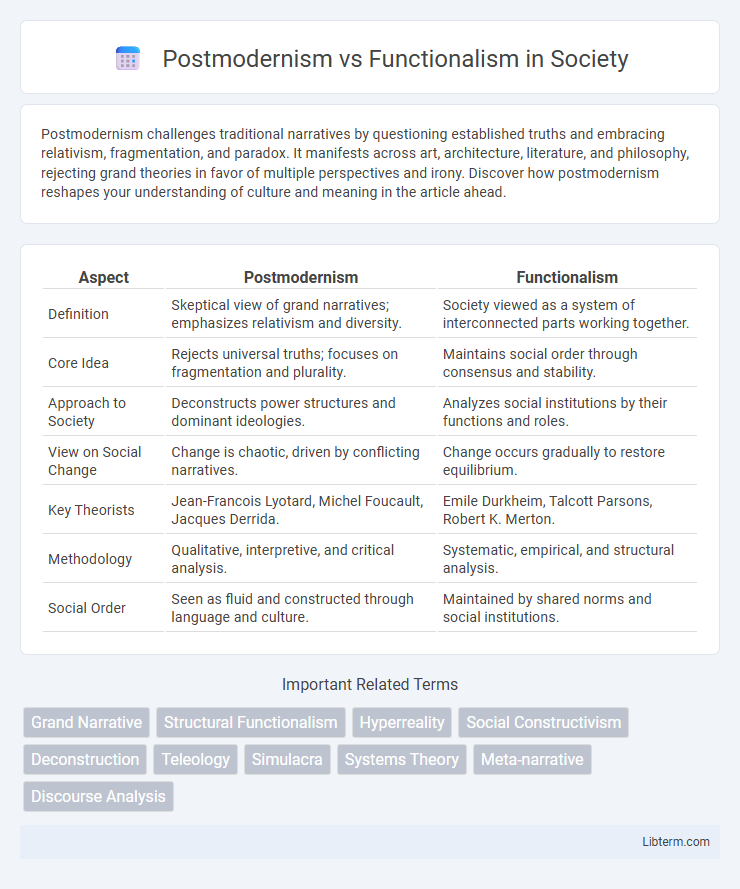Postmodernism challenges traditional narratives by questioning established truths and embracing relativism, fragmentation, and paradox. It manifests across art, architecture, literature, and philosophy, rejecting grand theories in favor of multiple perspectives and irony. Discover how postmodernism reshapes your understanding of culture and meaning in the article ahead.
Table of Comparison
| Aspect | Postmodernism | Functionalism |
|---|---|---|
| Definition | Skeptical view of grand narratives; emphasizes relativism and diversity. | Society viewed as a system of interconnected parts working together. |
| Core Idea | Rejects universal truths; focuses on fragmentation and plurality. | Maintains social order through consensus and stability. |
| Approach to Society | Deconstructs power structures and dominant ideologies. | Analyzes social institutions by their functions and roles. |
| View on Social Change | Change is chaotic, driven by conflicting narratives. | Change occurs gradually to restore equilibrium. |
| Key Theorists | Jean-Francois Lyotard, Michel Foucault, Jacques Derrida. | Emile Durkheim, Talcott Parsons, Robert K. Merton. |
| Methodology | Qualitative, interpretive, and critical analysis. | Systematic, empirical, and structural analysis. |
| Social Order | Seen as fluid and constructed through language and culture. | Maintained by shared norms and social institutions. |
Introduction to Postmodernism and Functionalism
Postmodernism challenges traditional narratives by emphasizing subjectivity, fragmentation, and the deconstruction of universal truths, contrasting sharply with Functionalism's focus on social structures and their roles in maintaining societal stability and cohesion. Functionalism analyzes society through the interconnected functions of its institutions, viewing each as essential to the overall equilibrium, while Postmodernism critiques this by highlighting power dynamics, cultural diversity, and the fluidity of meaning. These paradigms represent divergent approaches in sociology and philosophy, where Functionalism seeks order and functionality, and Postmodernism embraces complexity and skepticism of grand narratives.
Historical Context and Origins
Postmodernism emerged in the mid-20th century as a reaction against the Modernist ideals characterized by objectivity and universal truths, rooted in the aftermath of World War II and the cultural shifts of the 1960s. Functionalism originated in the early 20th century, heavily influenced by the works of sociologists like Emile Durkheim and anthropologists such as Bronislaw Malinowski, emphasizing social structures' roles in maintaining societal stability during rapid industrialization. Both paradigms reflect responses to historical changes: Functionalism addresses social cohesion in evolving societies, while Postmodernism critiques grand narratives and embraces cultural pluralism in a globalized era.
Core Principles of Functionalism
Functionalism centers on how social institutions and structures contribute to societal stability and cohesion by fulfilling essential functions. Emile Durkheim, a key figure in Functionalism, emphasized the importance of social facts and collective conscience in maintaining order. This theoretical perspective views society as an interconnected system where each part works to sustain the whole and promote equilibrium.
Key Concepts in Postmodernism
Postmodernism emphasizes skepticism toward grand narratives, highlighting the fragmentation of reality and the fluidity of identity, contrasting with Functionalism's focus on social cohesion and systematic order. Key concepts in Postmodernism include deconstruction, which challenges the stability of meaning, and hyperreality, where simulations replace authentic experiences. This paradigm critiques objective truths, promoting multiple perspectives and the decentralization of authority in understanding culture and society.
Comparative Analysis: Structure and Agency
Postmodernism challenges the Functionalist view by emphasizing the fragmented, decentralized nature of social structures and the active role of individuals in shaping meaning, contrasting with Functionalism's focus on stable institutions that maintain social order through predefined roles and norms. Functionalism prioritizes structure, seeing individuals as largely shaped by societal needs, whereas Postmodernism highlights agency, underlining diverse, subjective experiences and the fluidity of identity within social contexts. This comparative analysis reveals a fundamental tension: Functionalism's structural determinism versus Postmodernism's celebration of individual agency and cultural relativism.
Understanding Social Change through Both Lenses
Postmodernism challenges the grand narratives and fixed meanings central to Functionalism, emphasizing the fluidity and plurality of social realities in understanding social change. Functionalism views society as an interconnected system where each part serves a purpose for stability and continuity, interpreting social change as gradual adjustments within this system. Analyzing social change through both lenses reveals the tension between structural stability and cultural fragmentation, highlighting the complexity and multifaceted nature of societal transformation.
Critiques and Limitations of Functionalism
Functionalism faces critiques for its overly deterministic view of society, often ignoring individual agency and social change dynamics. Critics argue that it neglects power imbalances and conflict, failing to address issues of inequality and social justice. Its emphasis on social stability can lead to the justification of the status quo, limiting its ability to explain societal transformation and diversity.
Critiques and Limitations of Postmodernism
Postmodernism faces critiques for its skepticism toward grand narratives, leading to challenges in establishing coherent societal norms or concrete policy frameworks. Its emphasis on relativism often undermines objective truth claims, complicating consensus and actionable solutions in social and architectural domains. Functionalism, by contrast, is critiqued for oversimplifying social systems and ignoring cultural complexities but offers clear structures for functionality and stability absent in postmodern perspectives.
Influence on Contemporary Social Theory
Postmodernism challenges the universal truths and grand narratives foundational to Functionalism, emphasizing the fragmented, subjective nature of social reality and the plurality of perspectives in contemporary social theory. Functionalism's focus on social structures and stability informs the analysis of system interdependencies, but Postmodernism critiques its perceived rigidity and oversimplification of social dynamics. This dialectic shapes current sociological debates by integrating structural analysis with critical perspectives on power, identity, and discourse.
Conclusion: Reconciling Postmodernism and Functionalism
Reconciling Postmodernism and Functionalism requires acknowledging the strengths of each framework in understanding social structures and individual experiences. While Functionalism emphasizes systemic stability and social order through interconnected institutions, Postmodernism challenges grand narratives and highlights fragmented identities and multiple perspectives. Integrating these approaches fosters a comprehensive analysis that balances structural analysis with cultural and subjective complexities, enhancing sociological insight.
Postmodernism Infographic

 libterm.com
libterm.com